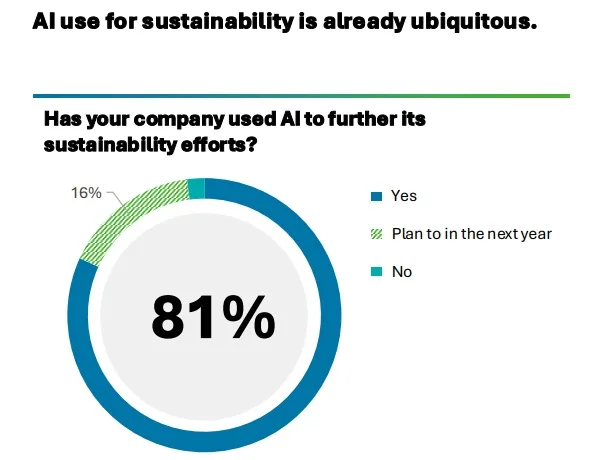Sustainability continues to hold a prominent place on the C-suite agenda. Deloitte Global’s 2025 survey of over 2,100 executives across 27 countries—now in its fourth year—shows sustainability ranking among the top three matters for global business leaders to focus on over the next year alongside technology adoption and innovation, and economic outlook. This year’s findings reveal both progress and complexity, with executives demonstrating continued investment while adopting a more selective, strategic approach to their sustainability initiatives.
Investment continues
Eighty-three percent of respondents reported increasing their sustainability investments in the last year, with 69% increasing somewhat (6–19%) and 14% increasing significantly (≥20%).
Technology adoption, particularly artificial intelligence (AI), appears to be playing an expanding role. Eighty-one percent of respondents indicated they are already using AI to further their company’s sustainability efforts, with applications spanning monitoring and reporting, scenario analysis, product innovation, and operational efficiency.

Leaders identify revenue generation as a key business benefit
Revenue generation emerged as the most frequently cited benefit across sustainability actions, followed by compliance-related outcomes, brand and reputation, and risk and resiliency. Very few respondents (10% or less) reported negative impacts on business outcomes from their sustainability initiatives.
A pragmatic path companies can follow
Based on multiple years of survey data, a set of sustainability actions is emerging as a de facto roadmap for leaders, including:
- Implementing technology solutions
- Using more sustainable materials
- Developing more sustainable products and services
- Implementing operational efficiency measures
- Tracking and disclosing sustainability metrics
Some actions show a slight decrease after years of advancement
Compared to last year, the survey reveals a slight decrease in the percentage of respondents who say they have undertaken certain sustainability actions including:
- Tying senior leaders’ compensation to sustainability performance: 36% vs. 43% (2025 vs. 2024)
- Requiring suppliers to meet specific sustainability standards: 38% vs. 47%
- Decreasing emissions by purchasing renewable energy: 42% vs. 49%.
These shifts may reflect a more selective and strategic approach rather than a retreat from sustainability commitments.
Shifting dynamics
The survey indicates changing dynamics in pressure. Across nearly every major stakeholder group, fewer respondents say they are feeling pressure to act on sustainability compared to 2022—for example, shareholders (71% in 2022 to 58% in 2025), boards (75% to 60%), governments (77% to 58%), and customers (75% to 57%). Respondents also indicate that climate change is now viewed as less disruptive to their business strategy in the near term than in past years.
Key questions for leaders
Today’s dynamic conditions provide an opportunity for organizations to reevaluate their sustainability ambition, strategy, investments, initiatives, and execution to help ensure they both meet their sustainability goals and further build resilience into their organizations. To guide that effort, leaders can consider:
- Which sustainability matters are material for their business and stakeholders?
- What resources is their organization willing and able to commit?
- How patient is their organization? How patient are their key stakeholders?
- What level of risk and uncertainty can their business tolerate?
- What are the dependencies? What would this action require?
The findings from Deloitte Global’s 2025 survey reflect a sustainability landscape that is both advancing and evolving. From AI adoption to increased investments, organizations are building resilience today to help shape the next wave of business value. Many leaders have an opportunity to assess whether their sustainability strategy and investments are integrated with key performance drivers, material risks, and strategic priorities—helping ensure they continue delivering value and operational resilience into the future.
